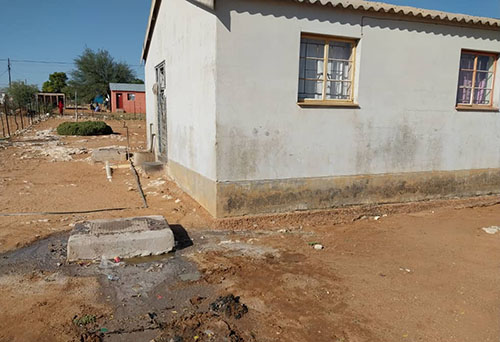Zebaldt Ngaruka
The Omaheke Regional Council is concerned about frequent vandalism and misuse of sewerage in the settlements, causing blockages and breakdown of sewerage services.
This response comes after an outcry from the residents, on the continuous overflowing of sewage in the various settlements in the region.
Tauno Iileka, the regional council spokesperson, revealed to New Era that the council has over the years invested a significant sewerage infrastructure in Epukiro, Corridor 13, Tallismanus, Aminuis and Omitara settlements to ensure access to municipal services for residents.
The council spent about N$280 000 this year alone for this purpose.
“Stoppage of sewer pipelines and manholes have been reported in some settlements as a result of inappropriate solid waste household items such as clothes, sanitary pads, and others being flushed down in the drains. Even unsuitable materials such as animal body parts are being disposed of in the manholes,” explained Iileka.
The senior PRO added that such blockages cause overflowing of sewer water from manholes and pump stations.
“This creates sewer ponds, which is the breeding ground for waterborne diseases such as cholera, hepatitis E, and other water related diseases. Livestock in some of those settlements end up drinking raw sewer water from the ponds, as a result aggravating the unhygienic conditions in settlements and compromising the health of livestock,” he alluded.
Iileka added that the regional council spends more money to get the services of experts to either unblock or repair damages on the sewerage infrastructure.
“It is an unsustainable situation, it causes financial strain on the council whereas such funds could have been used for other purposes,” he said.
The sustainability of service infrastructure, Iileka emphasised further is a joint effort of both the regional council and the beneficiaries of such infrastructure.
He thus calls on the community and inhabitants of various settlements in the region to refrain from vandalising and misusing the infrastructure.
“While continuous maintenance of infrastructure is necessary to ensure longevity and efficiency, communities are encouraged to report instances of vandalism to their respective settlement or constituency offices or regional council head office,” Iileka urged.
The nurse in charge at Epukiro Pos 3 clinic, Agnes Supii Tjiramba told New Era that sewage water poses serious health risks to people.
“It is very risky because standing water is a conducive area for mosquito eggs habitation and that will lead to malaria. The bad smell contaminates fresh air, children might play in that area and dirtify their hands, contaminate their food thus ingestion in their stomach and cause diarrhoea,” Tjiramba explained.
She also emphasised that flies that float around the wastewater sit on uncovered food and result in the transmission of diseases.
The chairperson of the Onderokomurungu waterpoint committee, Cecil Kavaka said the contaminated water posed a health risk to both humans and livestock.
“We do not have to blame the settlement office for these blockages. Our community members should work hand in hand to avoid flushing inappropriate solid waste in drains,” Kavaka said.
He called upon a settlement office to run a campaign that will educate the community on the importance of sewerage system in the settlement.


